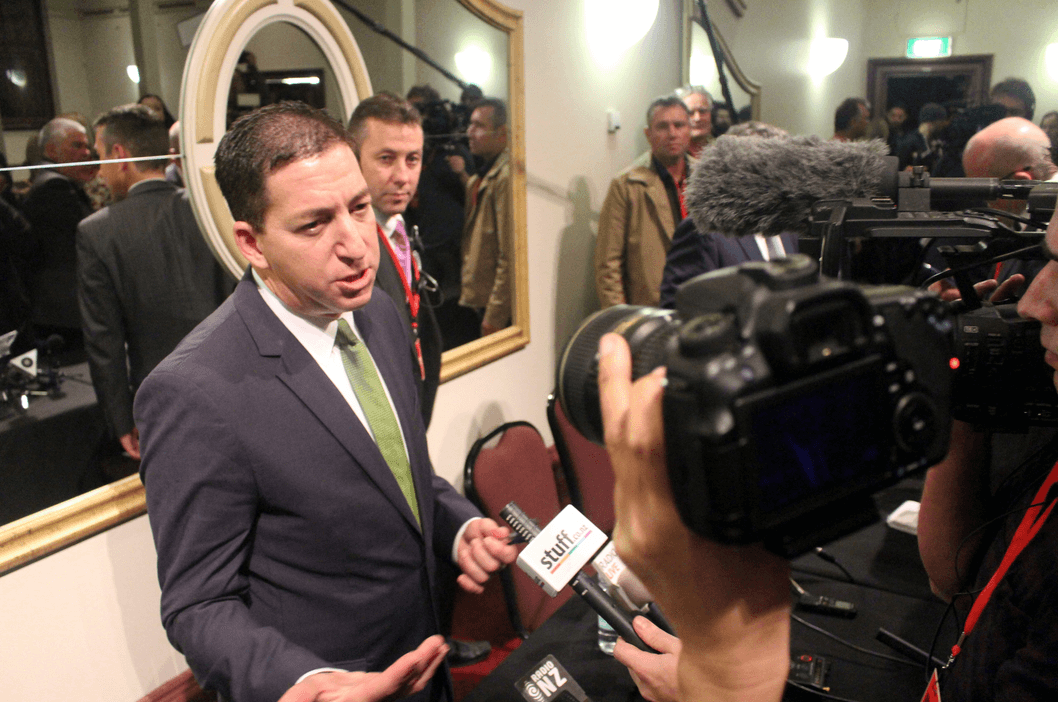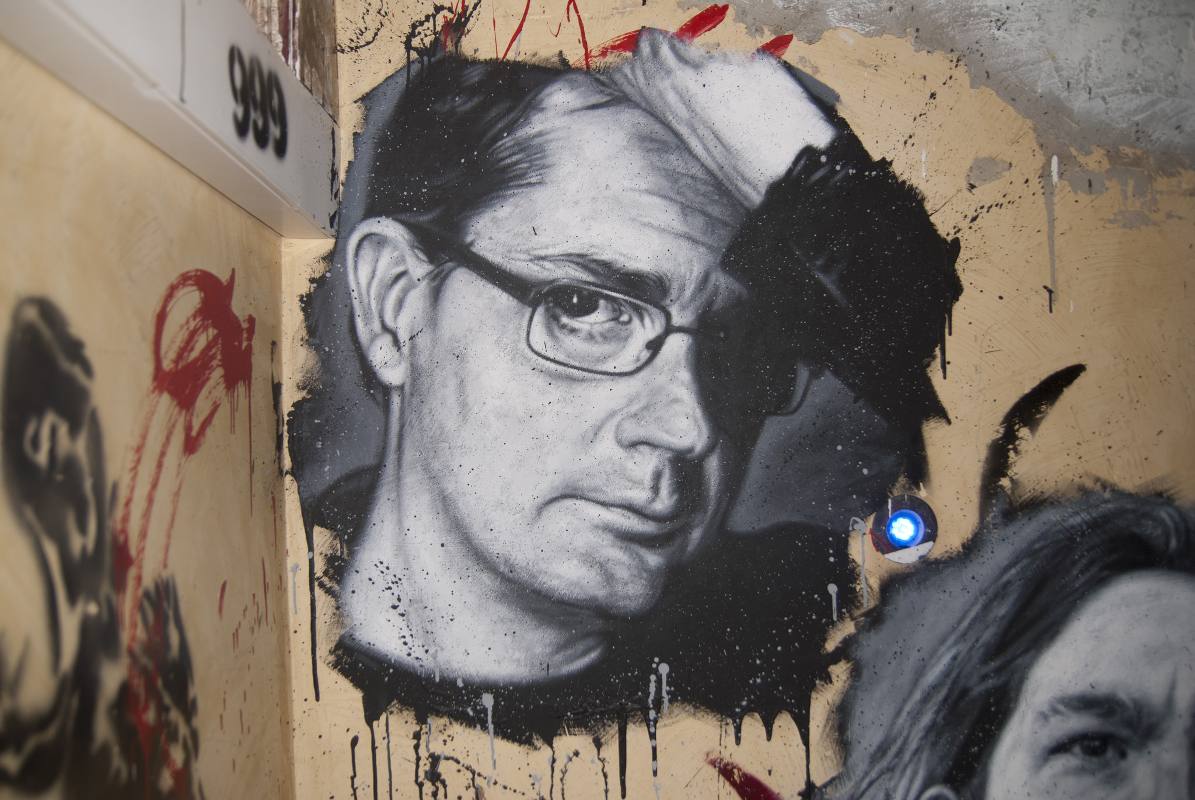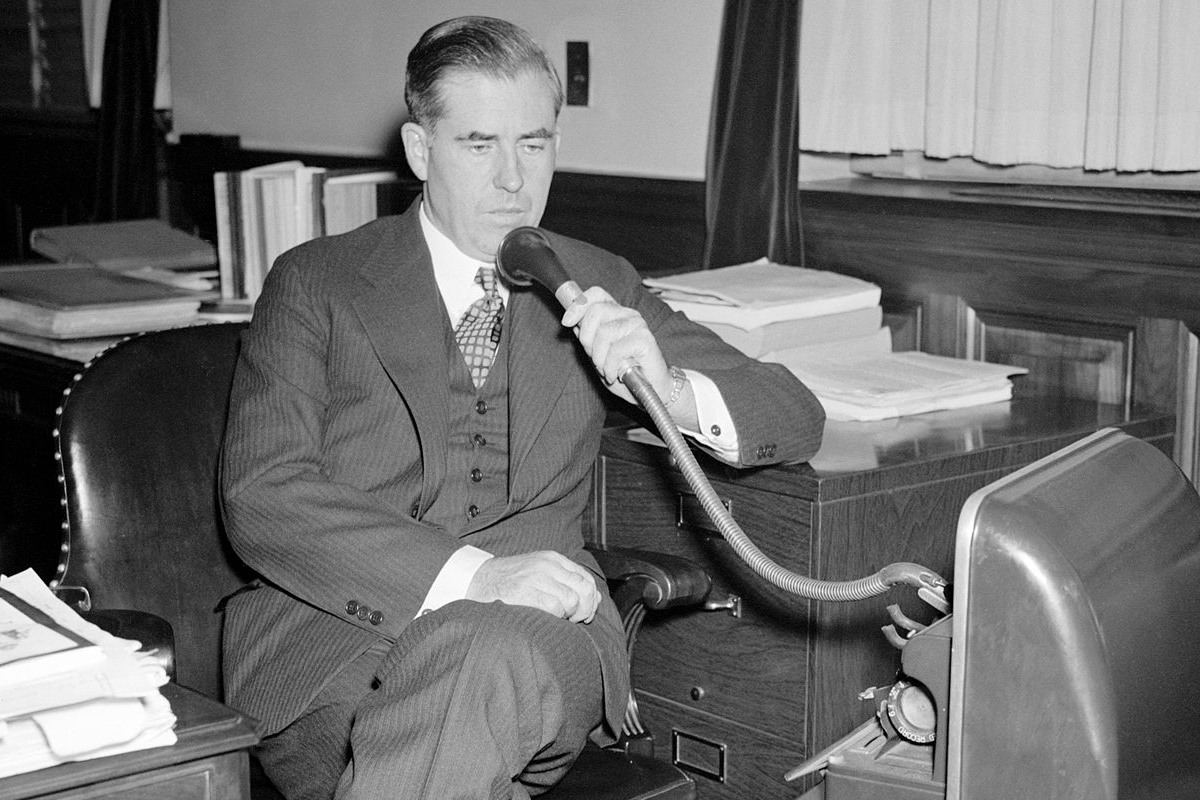Free Speech
Glenn Greenwald: Fascism's Fellow Traveller
Greenwald is never less than proud to acknowledge the considerable time he has spent as a litigator and writer defending the right of neo-Nazis to air their views.

“When Glenn Greenwald castigates the dead Charlie Hebdo cartoonists for racism,” the writer Sam Harris observed recently, “he’s not only proving that he’s a moral imbecile; he’s participating in a global war of ideas over free speech—and he’s on the wrong side of it.”
Back in April, the short story writer Deborah Eisenberg took a rather different view. In her letter to PEN’s executive director Suzanne Nossel, Eisenberg included Greenwald on a shortlist of people she considered worthier of PEN’s annual Freedom of Expression Award for Courage than the dead and surviving Charlie Hebdo staff. Unlike the slain cartoonists, she wrote of her recommendations, “their courage has been fastidiously exercised for the good of humanity.”
All things considered, this was an extravagant claim to make on behalf of Greenwald’s valour and integrity, particularly at Charlie Hebdo’s expense. Greenwald—formerly of Salon and the Guardian and now co-founding editor at Pierre Omidyar’s campaigning blog, the Intercept—is most famous as the journalist to whom rogue NSA employee Edward Snowden leaked a vast cache of national security information before finding sanctuary in Putin’s Russia. Eisenberg stated that it was for his work on this story that she was recommending him as an honouree.
But Greenwald’s reputation as an unbending defender of free expression stretches back a good deal further than this. Before becoming a writer, he had worked as a litigator defending clients in a number of controversial First Amendment suits, and has since written several trenchant polemics defending the right to unconditional free speech. In January 2013, for example, Greenwald wrote the following for the Guardian as part of a response to a French government proposal to censor online hate speech:
"The history of human knowledge is nothing more than the realization that yesterday’s pieties are actually shameful errors. It is constantly the case that human beings of the prior generation enshrined a belief as objectively, unchallengably [sic] true which the current generation came to see as wildly irrational or worse. All of the most cherished human dogmas—deemed so true and undeniable that dissent should be barred by the force of law—have been subsequently debunked, or at least discredited. How do you get yourself to believe that you’re exempt from this evolutionary process, that you reside so far above it that your ideas are entitled to be shielded from contradiction upon pain of imprisonment? The amount of self-regard required for that is staggering to me."
Reading this, it would seem logical to suppose that Greenwald’s solidarity with the staff of Charlie Hebdo could be taken for granted. The magazine has, after all, dedicated itself to mocking religious and political pieties, and its attackers, Chérif and Saïd Kouachi, were surely guilty of the self-regard for which Greenwald expresses such vehement contempt. They considered themselves to be emissaries of God, no less (or—more directly—His fanatical, self-appointed earthbound representatives in Yemen), and sought to shield their beliefs from precisely the kind of criticism and ridicule which eventually cause such cherished dogmas to collapse.
Instead, as Sam Harris noted, the blood had scarcely dried on the walls of Charlie Hebdo‘s offices before Greenwald published a furious article at the Intercept, reviling the magazine for its alleged racism and pouring scorn on its defenders. That his misreading of Charlie Hebdo demonstrated a profound ignorance of their material and a dismal inability to parse satire ought to have been beside the point. After all, as Greenwald was at pains to remind his readers, he has spent much of his life defending the freedom of people to express views he abhors.
But while he was careful to include a perfunctory, throat-clearing defence of Charlie Hebdo’s narrow right to ridicule Islam, Greenwald’s more pressing concern was the denigration of people murdered for publishing cartoons offensive to their assassins. More telling still was the corresponding absence of any criticism of Al Qaeda’s pitiless death squad. Beliefs held to be unchallengeable by Islamic fundamentalists (but wildly irrational by the rest of us) were, it seems, to be exempted from the evolutionary process after all. This is all because Greenwald’s commitment to free speech is subject to a couple of slippery caveats, which make it rather more porous than he likes to pretend.
He had hinted at Caveat One with a couple of lawyerly qualifications buried in the paean to counter-orthodoxy quoted above. Dissent, he had argued, should not be barred “by the force of law” nor ideas shielded “on pain of imprisonment.” In other words, as far as Greenwald is concerned, the only meaningful kind of censorship—and the only kind worth opposing—is that mandated by the state, thereby excluding the kind imposed by terror and carried out by non-state actors like the Kouachis.

In 2013, Greenwald had argued that the whole idea of hate speech is simply a culturally- and historically-specific instrument for preserving the status quo. By 2015—apparently unaware that he sounded exactly like those he had previously taken such pleasure in attacking—he was complaining that “some of Charlie Hebdo‘s cartoons were not just offensive but bigoted.”
Had the French authorities shared this judgement, Greenwald would doubtless have ridden to the magazine’s defence. In 2008, he had written in defence of Ezra Levant, who was being investigated by the Alberta Human Rights and Citizenship Commission for republishing the Danish cartoons of Muhammad in the Canadian neoconservative periodical Western Standard. “Here,” Greenwald had announced, “are the noxious fruits of hate speech laws,” and he found them to be “nothing short of stomach-churning.”
But the French state—which makes a clear distinction between anti-clericalism and racial hatred—did not share Greenwald’s assessment of Charlie Hebdo; the magazine has never fallen foul of France’s hate speech laws, the very existence of which Greenwald denounces as unacceptably draconian.
As it happens, I agree with Greenwald that state-sponsored hate speech laws are deplorable and reactionary, no matter how well-intended. But at least Levant is still alive to speak in his own defence. And in democracies like France and Canada, court verdicts can be appealed and overturned; bad laws can be repealed; and journalists like Greenwald can inveigh against those responsible for both from their pulpits at Salon and the Guardian.
Why then does Greenwald’s stomach also not churn for the victims of state censorship in, say, Russia, Venezuela, Iran, or the Palestinian territories? Journalists in such states enjoy none of the rights and protections afforded by liberal democracies, and yet, on the subject of state repression in unfree societies, Greenwald is conspicuously silent.
This brings us to Caveat Two, which is that Greenwald’s governing principle is not the absolute defence of free expression, but an absolute opposition to democratic governments, which he presumes to be motivated by authoritarianism, mendacity, and self-serving hypocrisy in every instance. For Greenwald, Western power and Zionism are the only enemies worthy of his critical attention; forces of unparalleled cynicism and cruelty against which all resistance, no matter how vicious and sadistic, must be indulgently understood.
So, when Ezra Levant is investigated for re-publishing anti-Islamic cartoons, it is evidence of the stomach-churning intolerance of the Canadian state; when Charlie Hebdo is not, it is evidence of the thoroughgoing racism of France:
[Charlie Hebdo‘s] messaging—this special affection for offensive anti-Islam speech – just so happens to coincide with, to feed, the militaristic foreign policy agenda of their governments and culture.
By the same token, Greenwald may be wholly ignorant of Mali’s history and politics, but once the French government announced military intervention there to halt jihadist violence, his position on the matter was as entirely predictable as it was entirely uninformed.
I have never found any reason to suspect that Greenwald is remotely interested in understanding the complex considerations that inform Western foreign policy decisions. Nor have I found any reason to suspect that he is interested in investigating or understanding Islamist ideology. He finds it more convenient to prejudge the former as invariably malevolent, and the latter as invariably reactive.
Such reductionism has the benefit of being instantly applicable in any given scenario, thereby removing the need for reflection, informed analysis, and independent thought. But it also comes burdened with considerable dangers, not least among which is the corollary belief that anyone attacking the West by word or deed is doing so with good reason. And this assumption has frequently left Greenwald well-disposed towards the arguments of authoritarian governments (so long as they are enemies of the West) and non-state actors hostile to the whole notion of liberal democracy.
Greenwald is never less than proud to acknowledge the considerable time he has spent as a litigator and writer defending the right of neo-Nazis to air their views. For a truly principled free speech activist, there would be no shame in that. But his condemnation of their beliefs often feels somewhat pro forma, and certainly pales next to the contempt he expresses for their enemies.
In 1999, for instance, a member of Matthew F. Hale’s white supremacist World Church of the Creator went on an interstate shooting spree that left two people dead and nine injured. A New York-based NGO called The Centre for Constitutional Rights filed suit against Hale and his Church on behalf of one of the victims, alleging them to be partly culpable. Explaining his decision to represent Hale, Greenwald objected that “all [the complainants] can say Matt Hale did is express the view that Jews and blacks are inferior. There’s just no question that expressing those views is a core First Amendment activity.” Well, okay. But, gratuitously, he then added: “I find that the people behind these lawsuits are truly so odious and repugnant, that creates its own motivation for me.” Hale, incidentally, was later convicted of attempting to solicit the murder of a district court judge and sentenced to 40 years in prison.
I sometimes get the feeling that Greenwald—an openly gay Jew—harbours a not-altogether grudging respect for unapologetic fascists. He sympathises with their marginalisation just as he would with any underdog; but he also seems to find their ideological certainty appealing, even if every dot and comma is not exactly to his taste. And he has sympathy to spare for any professions of hatred for Israel, no matter how inflammatory or defamatory those professions may be.
The undisguised pleasure Greenwald takes in the frisson of antisemitic provocation is what’s most striking about his Charlie Hebdo article. “To comport with this new principle for how one shows solidarity with free speech rights and a vibrant free press,” he jeered childishly, “we’re publishing some blasphemous and otherwise offensive cartoons about religion and their adherents…” (Notice, by the way, the casual diffusion of responsibility in his use of the first person plural here.)
What followed was a gruesome selection of cartoons, not one of which could reasonably be described as blasphemous or anti-clerical, and every one of which relied upon classical antisemitic conspiracist tropes about malevolent Jewish power and influence.
This was in turn followed by a comparably awful selection of cartoons by the notorious Arab-Brazilian artist Carlos Latuff, for whom Greenwald has expressed his unequivocal admiration. Latuff’s depictions of the Zionist octopus and of blood-drenched, genocidal Jews are frequently indistinguishable from those circulated in pre-war Europe, so it was no surprise to discover a lengthy comment below Greenwald’s article from former KKK Grand Wizard David Duke, which he concluded with this:
Thank You Mr. Greenwald for being courageous enough to dare to expose hypocrisy and racism wherever it is found even among the chosen few [who] have enormous power.
Duke’s use of the term “chosen” here was not, I suspect, accidental. When Greenwald complained in his article that Charlie Hebdo had fired a cartoonist for antisemitism, or when he protested on twitter about the arrest of the Holocaust denier Dieudonné M’Bala M’Bala, there was little evidence he felt their racism merited much in the way of condemnation. On the contrary, what really bothered him seemed to be the suspicion that Jews were getting special protection they did not deserve. In an ugly coincidence, Greenwald’s Intercept article appeared on 9 January—the same day that the Kouachi brothers’ associate, Amedy Coulibaly, murdered four Jews in a Parisian Hypercacher kosher food superette at Porte de Vincennes.
Given Glenn Greenwald’s prodigious contempt for the West, his impulsive sympathy for its enemies, and his generous indulgence of Jew hatred, his emergence as one of America’s most vehement Islamist fellow travellers was a forseeable development. And it is in their name that he has offered some of his most passionate arguments for free expression.

To take one example: when Tarek Mehanna, an al Qaeda affiliate, was convicted in 2012 of translating jihadist material and conspiring to commit murder in a foreign country (that of American soldiers in Iraq), Greenwald responded by writing:
"I believe history will be quite clear about who the actual criminals are in this case: not Mehanna, but rather the architects of the policies he felt compelled to battle and the entities that have conspired to consign him to a cage for two decades."
I rather doubt that, although time will tell, I suppose. But Greenwald then went even further and described the statement Mehanna delivered at his sentencing hearing (a masterwork of bad faith which he reproduced in full) as “incredibly eloquent [and] thoughtful.” It was, he enthused, “something quite amazing.” While Greenwald had taken care to record his disgust with Ezra Levant’s neoconservative views as he defended Levant’s right to express them, Mehanna was not just exonerated but eulogised without equivocation.
That Levant is a democrat, while Mehanna is the footsoldier for an antisemitic totalitarian ideology counts for little, it seems. Beholden to a worldview in which Islamists are only victims and never victimisers, Greenwald preferred to assume that because Mehanna also loathes American foreign policy and the Zionist entity, and because he also considers liberal democracy to be a hoax, he is in fact an ally of some description.
So what then are we to make of Greenwald’s involvement in the Snowden leak, for which Eisenberg insisted he be honoured at the expense of the Charlie Hebdo dead?
It is possible, I think, for reasonable people to disagree about the value of what Snowden disclosed, and the merits of his actions. But any serious assessment of either needs to take account of the enormous harm done to American credibility, diplomacy, and security as the US government struggles to contain the spread of jihadist terror and to defend its soldiers and citizens. The most generous reading of Snowden’s actions recognises this as collateral damage inflicted in pursuit of a greater libertarian good.
But Glenn Greenwald will make no such allowance. On the contrary, he has taken undisguised satisfaction in the havoc Snowden’s NSA leaks have caused, not least because he believes that the war on terror presently being waged against jihadist fanatics like Tarek Mehanna and the Kouachi brothers is a monstrous injustice. In the ongoing battle between democracy and religious totalitarianism, Greenwald has defiantly taken the side of the latter.
So, Greenwald’s condemnation of Charlie Hebdo‘s murdered staff was±like his position on pretty much everything—tediously predictable, and it rested on a refusal to perceive the rather large difference between fascism and its antithesis. For someone who postures as a First Amendment absolutist, this is a considerable moral failure.
But Eisenberg nominated Greenwald in Charlie Hebdo’s stead, not in spite of such views, but precisely because of them. In their own minds, the PEN dissenters were taking a courageous, principled, and nostalgic stand: courageous in its refusal to be swept along by liberal moral orthodoxy; principled in its rejection of sentimentality; and nostalgic in its defiant celebration of 1968’s once-uncompromising anti-Imperialism.
It didn’t matter that many of the murdered staff at Charlie Hebdo were themselves soixante-huitard veterans of the New Left, nor that they had retained the New Left’s anti-authoritarianism, its reflexive sympathy for the Palestinian cause, and its hatred of the unreconstructed nationalist far-right. For their refusal to qualify their mockery of radical Islam with an acknowledgment of its value in the fight against Zionism, Western racism, neoliberalism, foreign policy, and all the rest of it, they were deemed guilty of selling out their own radical spirit of ’68. And for lending their assistance to a ‘narrative’ (as one of the PEN dissenters termed it) that serves a baleful Western agenda, they were denounced.
The idea that Glenn Greenwald knows anything about the spirit of ’68 fills me with scepticism. I suspect he could hardly care less. But his inchoate rage against the West was useful to Eisenberg and her allies even so. Greenwald may be applauded by the likes of David Duke for circulating Jew-hatred; he may defend theo-fascists and neo-Nazis and denounce their opponents with rather more enthusiasm than is either seemly or necessary; and he may observe a shabby silence about the repression of dissent in authoritarian and theocratic states. But he may be judged to have “fastidiously exercised his courage for the good of humanity” just the same because, like Deborah Eisenberg and the rest of the self-regarding PEN dissenters, what actually fires his perverse moral disgust is not the threat to liberty and free speech posed by lethal theocratic terror, but the war being waged by the West to defeat it.






